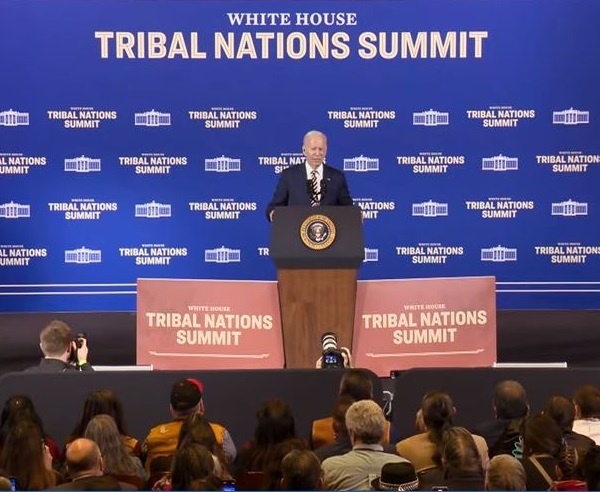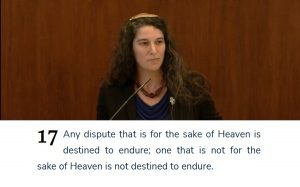Biden pledges aid, co-stewardship, respect at Tribal Nations Summit
4 min read
At the Tribal Nations Summit Nov. 30, the president of the United States emphasized the rule of law, including the importance of honoring treaties.
[00:00:09] Joe Biden: I made a commitment when I ran for president. In fact, I made a commitment when I was basically a 30-year-old senator and a student of Dan Inouye, a senator from the state of Hawaii, who made it clear to me because I said ‘Indian Country.’ He said, ‘No, Indian nations.’ Indian nations. I made a commitment my administration would prioritize and respect nation-to-nation relationships, and I’m going to make sure that happens.
[00:00:40] I hope our work in the past two years has demonstrated that we’re meeting that commitment. And that’s why I relaunched this convening and elevated event into a White House Tribal Nations Summit, because after a previous administration failed to convene any event, anything on this scale, on my watch we’re ushering in a new era of advancing a way for the federal government to work with tribal nations.
[00:01:06] John Q: The president announced over 60 Native American appointees, record funding, and a variety of initiatives.
[00:01:15] Joe Biden: As all of you know, there are tribal communities at risk of being washed away, washed away by superstorms, rising sea levels, and wildfires raging. I’ve flown over, flew over several thousand acres of the storms and the fires that have been in the West in particular and also down in the Southwest, and it’s devastating. That’s why today I’m announcing a $135 million commitment to help 11 tribal communities from Maine, Louisiana, Arizona, Washington state, and Alaska, to move—in some cases their entire communities—back to safer ground, and pay for that.
[00:01:54] I’ve also requested $9.1 billion. That’s with a ‘b’—billion dollars— for the Indian Health Services. I’ve asked Congress for the first time ever to make that funding mandatory—a mandatory part of the federal budget.
[00:02:14] That means the funding would always be there and it insulates Indian Health Services from budget uncertainty that makes it harder to deliver the care Indian Country needs and deserves. (Thank you!) Well, thank—we’ve got to get it done. I need your help in getting it done. And here’s another thing that’s very important to me.
[00:02:34] In last year’s summit, I signed an executive order to improve public safety in the criminal justice for Native Americans and to respond more effectively to the epidemic of missing and murdered Indigenous people. Since then, the United States Department of Justice and (Department of) Interior have created a lead new federal agency enforcement strategy that takes the special circumstances of these crimes into account.
[00:03:00] This is a priority to me and to the Justice Department, right. And so it’s using the Violence Against Women Act, which I wrote myself 30 years ago (as my sister would kid and say) with my own paw I sat down and wrote that because I feel so strongly about it, to end the scourge of violence against women everywhere.
[00:03:21] This year, I was proud to sign a reauthorization of this law that includes historic provisions that strengthen tribal sovereignty and safety. And today—
[00:03:38] And today I’m announcing even more critical actions that are the result of a meaningful and deliberate consultation process with you all. My administration listened. We heard you, and we’re implementing many of the changes you asked for. Today I signed a new presidential memorandum that improves consultation between the federal government and tribal nations based on key principles.
[00:04:00] Consultation has to be a two-way, nation-to-nation exchange of information. Federal agents should strive to reach consensus among the tribes. And there should be adequate time for ample communication. Federal agencies prepare a public record for what’s transpired during those consultations, and tribal nations should know how their contributions influence the decision-making.
[00:04:35] And this is a new presidential memorandum, requires all relevant federal agencies to get annual training on tribal consultation process. Let me say that again. All federal agencies.
[00:04:51] And so folks, it’s a whole changed approach. My administration also continues using all the available authorities, including the Antiquities Act to protect sacred tribal lands.
[00:05:03] John Q: He announced the restoration of national monuments and declared a new monument at Camp Hale.
[00:05:10] Joe Biden: …And there’s so much more. There’s so much more that we’re going to do to protect the treasured tribal lands. When it comes to Spirit Mountain and surrounding ridges and canyons in southern Nevada, I’m committed to protecting this sacred place that is central to the creation story of so many tribes that are here today.
[00:05:26] I’m also announcing that Deb (Haaland), as Secretary of Interior, will continue to work with the Secretary of Agriculture (who as I said, is here) to co-stewardship the federal lands, because that’s what it is.
[00:05:44] We’ve already signed over 20 new agreements with tribes this year, giving them a greater role in the stewardship of federal lands that are important to their cultures. And it’s not stopping there. We have 60 additional co-stewardship agreements currently under review, and I’m announcing today that the Secretary of Commerce is going to formally join these efforts as well.
[00:06:05] So let me close with the word my dad used all the time: Respect. Everyone is entitled to be treated with respect and dignity, the dignity that comes from just being who we are. This is especially true for tribal nations, to whom the United States owes a solemn trust in treaty obligations that we haven’t always lived up to…
[00:06:37] John Q: Announced at the Tribal Nations Summit by President Biden: A new focus on public safety for Native Americans; 20 new co-stewardship agreements and standards and training for tribal consultation; greater financial certainty for the Indian Health Service; protection for sacred sites; and the U.S. will relocate 11 tribal communities displaced by climate change.







